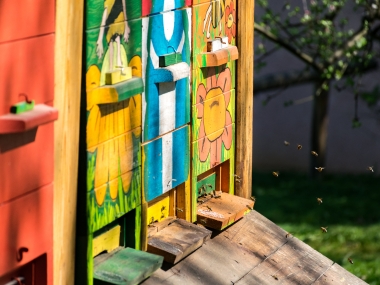World Bee Day 2020 - #BeTheBee!
Edited on
23 May 2020The celebration of the World Bee Day is addressing the biggest global problems - the role of bees and other pollinators to the existence of life on planet Earth, assuring food safety, preserving biodiversity… Though the aim of this newsletter is more modest - we just want to show a variety of actions that cities, neighbourhoods, institutions, companies and last but not least each of us can or shall take to contribute to a bigger story - to a cleaner and greener environment, and also to the preservation of natural resources and biodiversity. In the first part, we say a few words about the start of this initiative and this year’s international celebration. Then we want to share partnership knowledge gathered in thematic newsletters and guidelines. Nevertheless, there are six very diverse and innovative programmes of celebration to inspire you to join the Bee-friendly cities initiative.

![]()
Read the article in any of the other 6 languages:
English, Ελληνικά, Magyar, Italiano, Polski, Português, Slovenščina
![]()
Background drop of honey
20th of May (1743) is the birthday of Anton Janša, a Slovenian and a pioneer of modern beekeeping techniques. He was a beekeeping teacher at the court of the Empress Maria Theresa of Habsburg and adopted revolutionary beekeeping methods for that time, introducing bee grazing and redefined the role of drones. |
After over a decade, in 2014, »Honey for Breakfast Day in Slovenian Kindergartens and Schools« received its international recognition and several EU countries implemented “The European Honey Breakfast”. The movement also spread to public institutions and companies. It was one of the important grounds for the proclamation of the World Bee Day within the framework of the United Nations in December 2017. The campaign was initiated by the Republic of Slovenia in close cooperation with several governmental and nongovernmental institutions, such as Slovenian Beekeepers’ Association on the national level and Apimondia, the International Federation of Beekeepers’ Associations on the international level. It was supported by all UN states, while 115 countries also co-signed the resolution, i.e. they acted as co-sponsors, including major countries such as the USA, Canada, China, Russia, India, Brazil, Argentina, Australia and all EU Member States.
»Bee Engaged«
This year the World Bee Day international celebration title is »Bee Engaged«. The Food and Agriculture Organisation of the United Nations (FAO) in partnership with the Chinese Academy of Agricultural Sciences (CAAS), the Apicultural Science Association of China (ASAC), the Permanent Representation of Slovenia and Apimondia, will hold a virtual celebration. The event will highlight the importance of bees and their products, and the role of beekeepers. It will also shed light on the impact of the COVID-19 pandemic on the beekeeping sector and how it affects production, markets and as a consequence, the livelihoods of beekeepers. See more on http://www.fao.org/webcast/home/ar/
Celebrations will also take place in several countries and cities around the globe. We are suggesting just two links where you can find more information https://www.worldbeeday.org/si/, http://www.fao.org/pollination/world-bee-day/en/.
Join the Bee-friendly city movement
The City of Ljubljana successfully addressed challenges such as increased pollution, loss of natural resources and a decrease of biodiversity…, created a network of 35 voluntary members from various backgrounds (e.g. beekeepers, educational, cultural and health institutions, companies, NGOs, etc.) and in close cooperation with them designed the BEE PATH to become a network of stakeholders, a touristic and educational path, an educational programme, as well as a “think-tank” and an “incubator" for development of new entrepreneurship ideas. Its’ success was rewarded when it was awarded the title of URBACT Good Practice.
Newsletters’ thematic articles: Bees and pollination are important factors for biodiversity as well as in the economy Teaching the youngest to take care of the environment will green each street of your city Awareness raising in the athropocene: defending the bees is defending ourselves Apitourism an alternative, enjoyable and challenging activity for demanding citizens and tourists! |
Within the BeePathNet – transfer network, a project supported by URBACT whose holistic approach to urban beekeeping is being transferred to five bee-friendly European cities. The BeePathNet network is creating favourable conditions for sustainable urban beekeeping, which approached the issues of preserving urban biodiversity and urban food self-sufficiency through the “bee perspective”. It connects 6 EU Cities – Ljubljana, Slovenia, as the lead partner, Amarante, Portugal, Bydgoszcz, Poland, Cesena, Italia, Nea Propontida, Greece and Hegyvídek - XII. District of Budapest, Hungary.
Partnership issued thematic newsletters on biodiversity, education, awareness raising and tourism and two more volumes will be published in the following months (new products and final volume). Each of them provides a comprehensive redline article, selected research to deepen your knowledge – Brainy bee, News from Bee cities, What is buzzing up and some Amazzzzing facts about Bees.
To share knowledge within the partnership and also with other cities that would like to evolve into more Bee friendly cities we developed thematic guidelines. In each of them, you will find a detailed description of a specific theme developed in the City of Ljubljana, case study for the partner city, tips and tricks and all additional documentation to support the knowledge transfer. Already published guidelines are listed below and a few more will be published in the following months:
- BeePathNet Guidelines – Volume 2 Management of BeePathNet Urban Local Groups
- BeePathNet Guidelines – Volume 0 Presentation of the BEE PATH good practice
- Guidelines were delivered as several PPT presentations and sessions throughout Boot Camp in Ljubljana 8. – 12. 4. 2019
- Case study with guidance on the maintenance of biodiversity in urban areas
- BeePathNet educational packages and materials with guidance on their implementation
The guidelines are published in English to spread knowledge and partners good practice, though the thematic newsletters are published in seven EU languages. They are available on the URBACT webpage https://urbact.eu/beepathnet
What is going to buzz up in BeePathNet partner cities on the World Bee Day 2020
 We would also like to highlight some of BeePathNet partner cities World Bee Day 2020 celebrations to give EU cities and residents an inspiration. Due to circumstances, we moved a part of activities from the streets to the social environment and in May organised different awareness raising campaigns, online games, webinars… Some of them will be organised in the following months when the safety situation calms down. Nevertheless, we need to protect our neighbourhoods and cheer up the city bees with beautiful melliferous flowers most of the year.
We would also like to highlight some of BeePathNet partner cities World Bee Day 2020 celebrations to give EU cities and residents an inspiration. Due to circumstances, we moved a part of activities from the streets to the social environment and in May organised different awareness raising campaigns, online games, webinars… Some of them will be organised in the following months when the safety situation calms down. Nevertheless, we need to protect our neighbourhoods and cheer up the city bees with beautiful melliferous flowers most of the year.
In Ljubljana (Slovenia) under the title »Young bees build the green city of Ljubljana« you can visit the exhibition of designs of hives and useful objects like souvenirs, flower pots with honey plants, carrier bags and boxes for bee products… designed by students of the Faculty of Design under the project BeeKull; hike through the city’s Bee Path, flower your balcony or public places within the initiative »Let's help the bee – plant flowers in the city«… or at least stick a Bee ribbon on your chest or FB profile.
In Cesena, the celebration of WBD 2020 will trigger their campaign “Cesena amica delle api” (Cesena – a friend of the bees; Italy) that will take place in the following months. During this freaky spring when citizens remain stuck in their houses and (re)discover the smell of clean air, the sound of birds and bees and butterflies on balconies they will share knowledge, ideas and good vibrations.
Bydgoszcz (Poland) named its campaign »Urban reality of bees and people - let’s create a more bee-friendly world«. In addition to educational short films, a brochure… they will step into citizens’ life by publishing information about bees, bee proverbs … photos will appear on LED boards at bus and tram stops as well as with special graphic that will appear on billboards on 20 May 2020.
 »Amarante, a bee-friendly city« (Portugal) is a set of diversified activities seeking to raise awareness of the importance of bees in the natural world, as well as of hive products: Balcony displays of homemade bees - school children will give wings to their imagination while producing bees models, writing contests of stories about bees, online tale time, lectures, round table…
»Amarante, a bee-friendly city« (Portugal) is a set of diversified activities seeking to raise awareness of the importance of bees in the natural world, as well as of hive products: Balcony displays of homemade bees - school children will give wings to their imagination while producing bees models, writing contests of stories about bees, online tale time, lectures, round table…
Under the title »#stayathome and become an urban gardener!« Hegyvidék (Hungary) will carry out several exciting activities by the end of May. To protect pollinators and for the benefit of the district's residents they will be seeding more than thirty melliferous plant species on multiple public green spaces; plant melliferous saplings in one of the districts’ street that can be adopted by the area residents who will spoil them with water on dry days…
In Nea Propontida (Greece), for now, »Learning from the bees and for the bees, through Aprioristic activities« will take place online, but as soon as the time is right they will launch their first aprioristic activities as a wonderful trip to gastronomy, a journey to the knowledge and contribution of the bees to pollination, a tour of the city and establishment of hotels for solitary bees, a trip to a hospitable apiary in the mountains…
There are several opportunities for cities, neighbourhoods or citizens to celebrate World Bee Day. If not for the Bees, do it for yourselves and your children’s children. So, be the Bee - join the initiative of Bee friendly cities movement!
#BeTheBee!
 Submitted by v.erhart on
Submitted by v.erhart on
